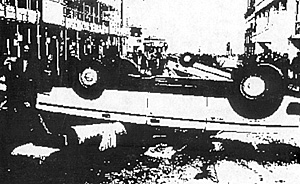
"War is simply a continuation of
political intercourse, with the addition of other
means."
I think people with a serious interest in history and a need to understand it through simulations ought to make some effort to understand the full spectrum of social violence. Simulacrum 1, Brandon Einhom wrote on political rules in strategic wargames.
He said: "A wargame that allows the players to ignore the political realities of the day does not give the players insight into why the war was conducted as it was." Too true; however, I've read letters in Moves and S&T from time to time complaining about "obnoxious political rules in military games", as if the designer had walked into the house tracking dog fudge off his shoes. People who write letters like this are usually so enamoured of numbers and factor-counting they would probably be better off switching to trainspotting for a hobby.
In this article, I will write about those games dealing with the flip-side of the coin, i.e., the military considerations of basically political situations, particularly those dealing with domestic revolt. Violent domestic disorder - in a sense, war between a people and its own govemment - is an event that occurs at least as frequently as wars between nations, has been the genesis of many such wars, and often yields more decisive results. And yet, in the approximately 2,500 published board wargames that have been catalogued by Messrs. Pimper and Boone, we find a mere handful of designs that directly or peripherally with civilian disorders and how Authority deals with them.. Why?
First, the subject is not very glamourous. War itself is not glamourous either, but gainers are self-conditioned to think of it as such. Given a choice, your typical gamer would rather be the dashing captain of hussars leading a charge against the Prussians, instead of some Palestinian kid with a slingshot and a pocket full of ball bearings.
Second, the subject is hard to quantify - or rather, the parts that can be reliably quantified (numbers of men, rates of fire, thickness of armor plate) do not combine to make a balanced game, especially in modern times. Edward Luttwak, in his book Coup d'Elat, says: "Trotsky noted that, while the French mobs of 1789 could rush positions defended by infantry soldiers, in 1917 a Russian mob - however large and determined would be cut down by modern automatic weapons. By 'modern' he meant the clumsy and slow-firing Maxim machinegun; today every single soldier on mob control could be armed with a weapon giving a similar rate of fire." Yet it is a rare country today that is completely free of violent social disorder. What needs to be simulated is a psychological contest of wills - something which has nothing to do with the rate of fire of a machine gun, but with the willingness of the man on the trigger (or his superiors) to use it.
I have come across several games devoted to the unpopular but I believe relevant topic of domestic revolt, and several more that deal peripherally with it through scenarios or variants. They are in chronological order:
More Civil Wargames
-
Introduction
On Topic Titles
-
Up Against the Wall, Motherfucker!
The Cities Game
Chicago, Chicago!
Minuteman
LA Lawless
Civil Power
Peripheral Titles
Back to Simulacrum Vol. 1 No. 2 Table of Contents
Back to Simulacrum List of Issues
Back to MagWeb Master Magazine List
© Copyright 1998 by Steambubble Graphics
This article appears in MagWeb (Magazine Web) on the Internet World Wide Web. Other military history articles and gaming articles are available at http://www.magweb.com